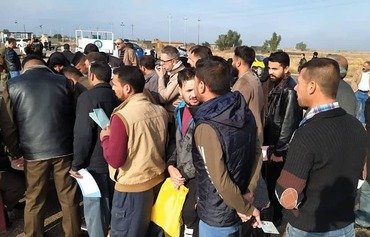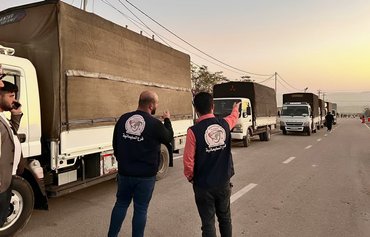Iraqi militias affiliated with Iran's Islamic Revolutionary Guard Corps (IRGC) have been obstructing the return of displaced families to their areas in Diyala and other provinces, civilians and officials tell Diyaruna.
On August 20th, Asaib Ahl al-Haq and Badr militants intercepted six government buses carrying some 118 displaced Iraqi families from al-Saadiya camp in Diyala province, where they were living for several years.
The families were vetted by security forces and were found to have not co-operated with any terrorist group affiliated with the "Islamic State of Iraq and Syria" (ISIS), and thus allowed to return.
However, claiming the displaced families "are a threat to the area's security", militants refused to allow them back to their homes and lands in the Kanaan district of north-eastern Diyala.
The families' return was part of a government-sponsored voluntary return programme for Iraq's internally displaced persons (IDPs), supported by the UN Mission in Baghdad.
Ahmed Abbas al-Zaidi, a Kanaan district council member, said that since the families, including many women and children, stayed in extreme heat for hours, security forces escorted them back to the al-Saadiya camp.
The hope is that their stay at the camp would be temporary while local authorities make efforts to facilitate their return, he told Diyaruna.
Defying government authority
Al-Zaidi said armed militias are defying government authority by obstructing the return of IDPs to 11 villages and towns in Diyala province alone. Militants claim they would face tribal vengeance should they allow families to return.
Despite the claim, he said, in reality, IRGC-backed militias are responsible for plotting to obstruct the IDPs' return.
Raad al-Dahlaki, Iraqi MP for Diyala and chairman of the parliamentary committee for immigration and displacement, called on Prime Minister Mustafa Kadhemi to clear the province of the lawless militias wreaking havoc on Diyala.
"The militias are seeking demographic change in Diyala," he said in a statement. "In his capacity as Commander-in-Chief of the Armed Forces, the prime minister must launch a massive operation in Diyala to clear it of unlicensed weapons, which would allow for the return of IDPs."
'First ISIS, now IRGC'
The Iraqi War Crimes Documentation Centre, an Iraqi non-governmental human rights organisation, also issued a statement, noting that this is not the first time the militias have systematically prevented residents from returning to Diyala, most notably for sectarian reasons.
That scenario is being repeated in several regions in Iraq, including Babel, Anbar and Salaheddine, Iraqi MP Hamid al-Mutlaq told Diyaruna.
He said the government is making efforts to make IDPs' return possible,"but the militias have become "a huge problem", which the public has now started to sense.
Riyad Jassem al-Zaidi, 34, an IDP who was on one of the buses heading home to Diyala, said, "First, we were displaced by ISIS, now we are displaced by IRGC-affiliated militias. It seems like there is not a big difference between the two."
"I have returned to the camp," he told Diyaruna. "But some people who have [enough] money rented accommodation elsewhere, because returning to the camp is really depressing. Everyone was happy that, for the first time in a long time, they would be sleeping under a roof and behind a door, not in a tent."

![The Iraqi Ministry of Migration and Displacement has facilitated the return of hundreds of families to al-Saadiya area in Diyala province on August 13th. Some 118 families have been prevented from returning by Iran-backed militias despite being vetted by security forces. [Photo courtesy of the Ministry of Migration and Displacement]](/cnmi_di/images/2020/09/09/25985-iraq-idp-diyala-600_384.jpg)





